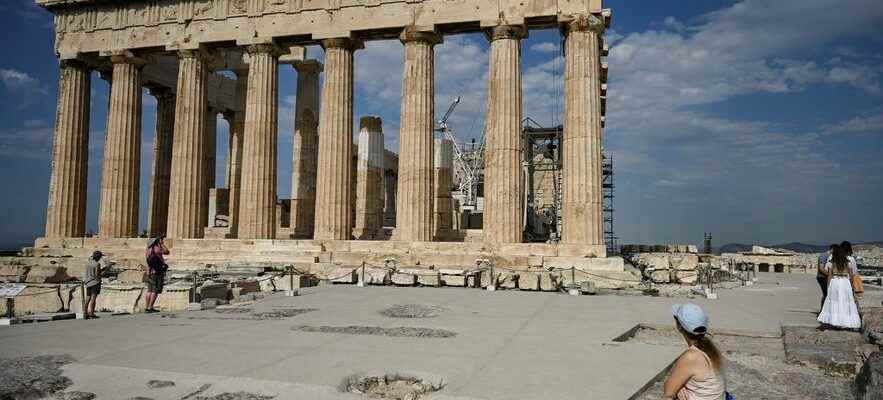The light of the winter sun sublimates the marbles displayed in the gallery of the museum of the Acropolis of Athens almost deserted, this January morning. Dimitri Sarris, an avid tour guide, walks past these authentic fragments carved in the 5th century BCE, lined with fake white castings. They form a real-size reconstruction of the 160-meter frieze that decorated the Parthenon, the famous temple that dominates the heights of Athens.
Dimitri Sarris points to the inscription “BM”, for “British Museum”, under each of the fake casts exhibited. Impossible, for the few visitors, to escape this detail… A way of insisting on a fact: many real marbles are exhibited far from here, in this London museum which holds more than 75 meters of the original frieze, as well as other sculptures from the Parthenon. For forty years, Athens has been demanding the full restitution of these marbles, detached from the ancient temple in 1802 by the British ambassador Lord Elgin. The Acropolis Museum was even erected in 2009 in the hope of their return, in response to the unofficial argument of the British who judged that Athens did not have a suitable place to house the friezes.
Between its glass walls, everything recalls the British “looting” of these marbles by Lord Elgin, according to the Greeks, who “stole” them when the country was under Ottoman occupation. But according to London, they were acquired “legally” at the time, from the authorities of the empire. “These sculptures must be brought together because they form a whole, exclaims Dimitri Sarris. They have their place in this museum which can accommodate them, next to the temple to which they belong.” Through the glass window of the museum, the guide points a finger, just 600 meters away, to the boneless Parthenon – the most visited monument in Greece, which has survived the ages.
Tourists visit the Parthenon on June 4, 2021 in Athens.
© / afp.com/Aris MESSINIS
Early January, the american agency Bloomberg evoked a possible “long-term loan” of the marbles by the United Kingdom, in exchange for other Greek antiquities, fueling the illusion of a repatriation of these sculptures. The British Secretary of State for Culture, Michelle Donelandefinitively put a stop to speculation, as of January 11, by affirming that the Parthenon marbles exhibited in the British Museum “belong to the United Kingdom”.
A forty-year struggle
“There were contradictory statements and a media frenzy,” reacts historian Kris Tytgat, an archaeologist specializing in ancient Greece, who never believed in an immediate restitution of the marbles. A return of these sculptures in the form of a loan “will never be accepted by Greece”, assures the expert, also president of the International Association for the Reunification of the Sculptures of the Parthenon. For Athens, this would amount to recognizing the ownership of the United Kingdom on these marbles. It would also be abandoning a fierce political fight for unconditional restitution, initiated in 1983, and very popular in public opinion.
A large part of the Greeks also perceived these rumors in the press in January as a political stunt from the right. The objective: to win votes a few months before the legislative election, which is to be held this summer. Right-wing Prime Minister Kyriakos Mitsotakissaid himself: “If the Greek citizens still believe in us, I believe that we will achieve this goal [NDLR : le retour des marbres] after the elections.”
For Omorfia, an Athenian who followed the case, “the issue of marbles is used by all politicians, nothing new!” Tired, she no longer believes in their return: “There are endless discussions. Greece built the Acropolis museum to repatriate these sculptures, it was an opportunity, but nothing happened…”
London does not want to open the “Pandora’s box”
For the United Kingdom, a return of the friezes “would open Pandora’s box” recalled the British Secretary of State for Culture. The act would set a precedent for the return to their countries of origin of other cultural property on display in UK museums. However, the British Museum alone has more than seven million objects from all continents. And if it holds the major part of the frieze of the Parthenon, other fragments are also scattered in France – at the Louvre, which refused to react on the question -, in Germany, in Denmark, in the Vatican, or in Germany . The debate therefore goes beyond the Greek-British dispute.
Should Western museums return works of art? “Certainly, answers Despina Koutsoumba, the president of the Association of Greek Archaeologists. The British Museum, like the Louvre, are colonial museums where any exhibited treasure has been stolen or taken away without clear authorization. The works must be returned, placed in their original contexts. If museums want foreign collections, there are temporary exhibitions!”
The archaeologist welcomes the “progress” made worldwide in recent years, such as the recent restitution of objects acquired in a colonial context. Thus, in 2021, France has returned in Benin 26 works from the royal treasures of Abomey, carried away by colonial troops in 1892. In December, Germany handed over to Nigeria twenty bronzes, looted in 1897. public domain, and often remain protected. A British law of 1963 prohibits the British Museum from selling or transferring any object from its collections. The marbles are not about to return to Athens.
